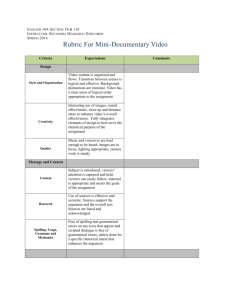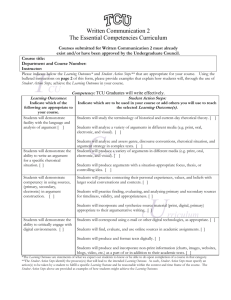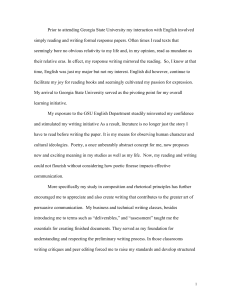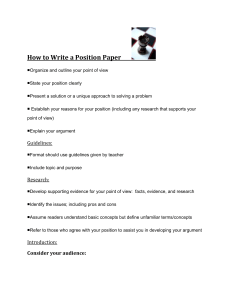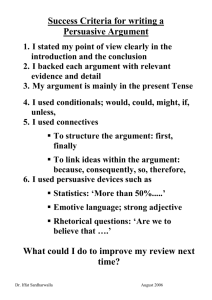WA_CH3_Summary
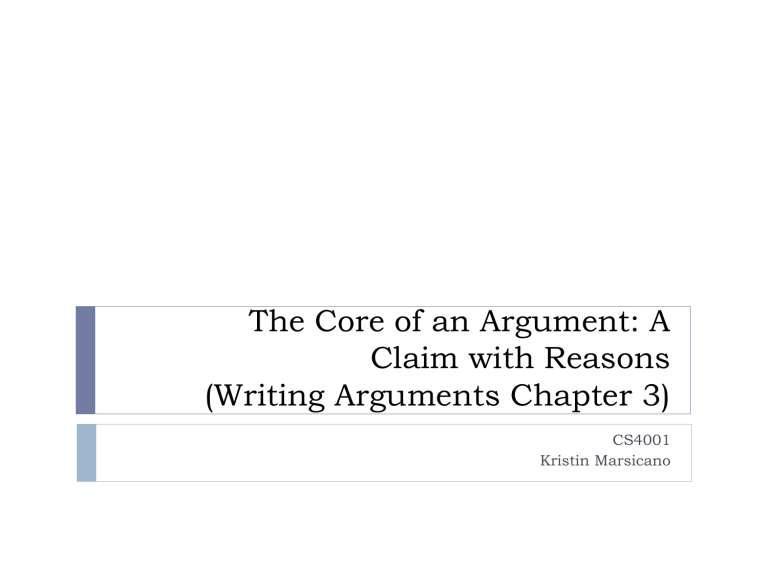
The Core of an Argument: A
Claim with Reasons
(Writing Arguments Chapter 3)
CS4001
Kristin Marsicano
Discussion/Review Questions
What are the three parts of the rhetorical triangle, what do they mean, to whom/what do they apply?
Rhetorical Triangle
Logos internal consistency and clarity logic of reasons and support (logical appeal)
Ethos credibility of arguer care in presenting alternate views writer investment in claims possibly reputation for honesty and expertise (ethical appeal)
Pathos appealing to audiences imaginative sympathies making argument palpable and immediate
Rhetorical Triangle
Message
(LOGOS: How can I make the argument consistent and logical? How can I find the best reasons and evidence?)
Audience
(PATHOS: How can I make the reader open to my message? How can I appeal to the reader’s values and interests?)
Writer or Speaker:
(ETHOS: How can
I present myself effectively? How can I enhance my credibility and trustworthiness?)
Discussion/Review Questions
What are the three parts of the rhetorical triangle, what do they mean, to whom/what do they apply?
What are facts and how do they increase the persuasiveness of an argument?
Facts…What are they?
“A non-controversial piece of data that is verifiable through observation or through appeal to communally accepted authorities”
Facts can increase persuasiveness by having
Recency. What’s the latest data?
Representativeness. Are the supporting examples typical rather than extreme or rare.
Sufficiency. Are there enough examples to justify the point.
(No hasty generalization.)
Discussion/Review Questions
What are the three parts of the rhetorical triangle, what do they mean, to whom/what do they apply?
What are facts and how do they increase the persuasiveness of an argument?
What is the difference between an information question and an issue?
Issue Questions are the Basis of Argument
Issue question: controversial question that gives rise to alternative answers.
Issue versus information questions
Some questions merely call for more information, not argument. In answering an information question, you assume the role of a teacher.
But if you must assume the role of an advocate, then the question is an issue question.
Also if the facts of the answer are controversial, then the question is an issue question.
Information vs. Issue
Which of the following is are issue questions and which are information questions?
What is the percentage that CS enrollments in the U.S. declined in 2005?
Information vs. Issue
Which of the following is are issue questions and which are information questions?
What is the percentage that CS enrollments in the U.S. declined in 2005?
What is the effect of outsourcing statistics on CS enrollments in the U.S.?
Information vs. Issue
Which of the following is are issue questions and which are information questions?
What is the percentage that CS enrollments in the U.S. declined in 2005?
What is the effect of outsourcing statistics on CS enrollments in the U.S.?
What is the reason that enrollments in CS in the U.S. are now increasing?
Discussion/Review Questions
What are the three parts of the rhetorical triangle, what do they mean, to whom/what do they apply?
What are facts and how do they increase the persuasiveness of an argument?
What is the difference between an information question and an issue?
A genuine (not pseudo-argument) requires two ingredients—what are they?
Arguments VS Pseudo Arguments
A genuine argument requires
Reasonable participants who operate within the conventions of reasonable behavior.
Potentially shareable assumptions that can serve as a starting place or foundation for the argument.
Otherwise, it is a pseudo-argument:
Fanatical believers or fanatical skeptics
Lack of shared assumptions
Discussion/Review Questions
What are the three parts of the rhetorical triangle, what do they mean, to whom/what do they apply?
What are facts and how do they increase the persuasiveness of an argument?
What is the difference between an information question and an issue?
A genuine (not pseudo-argument) requires two ingredients—what are they?
How do we support our claims for an issue?
Arguments: Claims Supported by Reasons
A reason is a claim used to support another claim.
Reasons are usually linked to their claims with words like
because, thus, since, consequently, and therefore to underscore their logical connection.
Formulating lists of reasons for the competing views can break the persuasive task into more manageable subtasks.
A good way to formulate an argument is to create a working thesis statement that summarizes your main reasons as because clauses attached to your claim.
However, be aware of the opposing points of view.
Argumentation Workout
